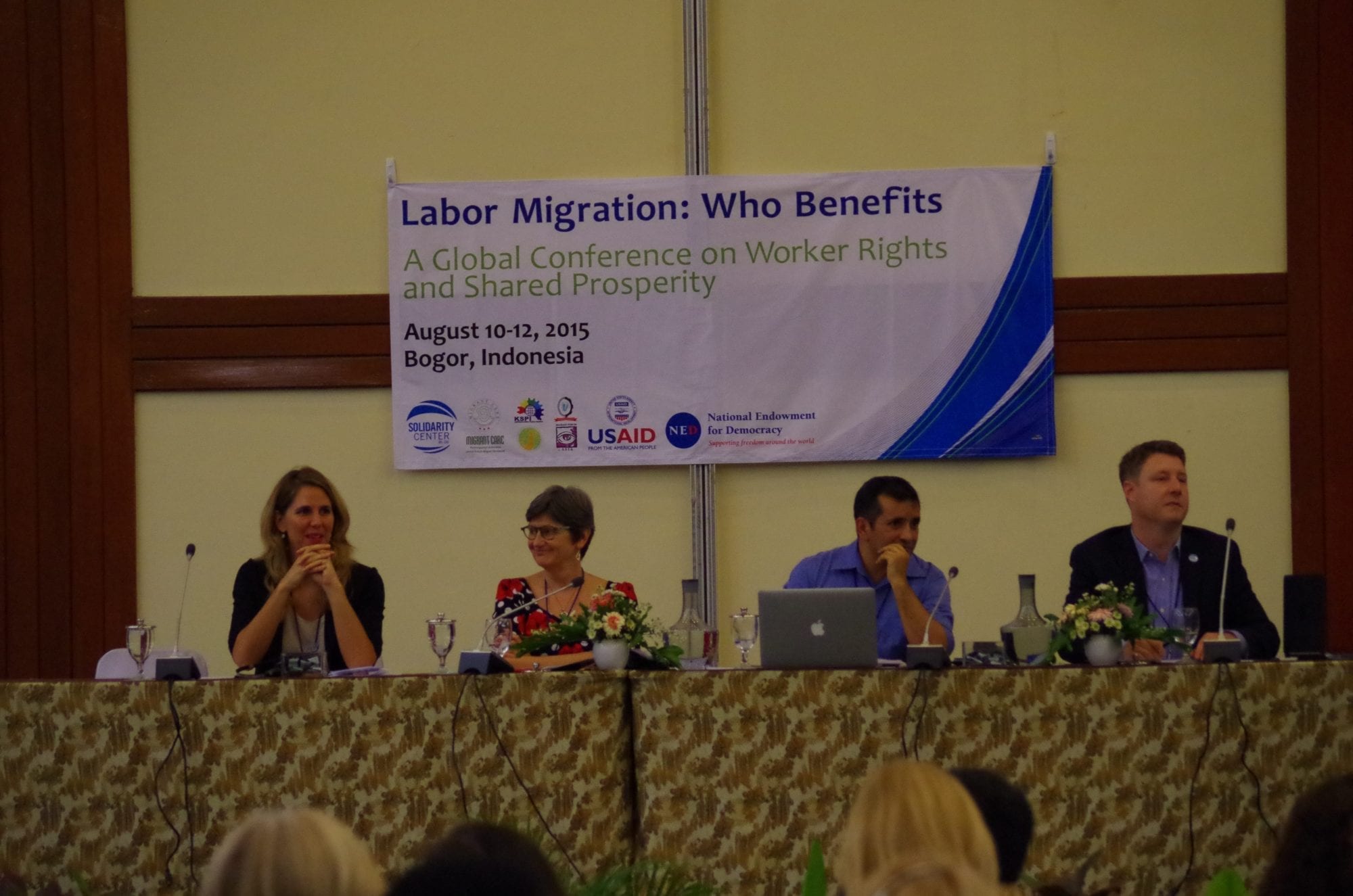
Aug 10, 2015
Asia’s growth as a global factory comes at a price, says Sanjiv Pandita, executive director of the Asia Monitor Resource Center (AMRC) in Hong Kong, Special Adminstrative Region of China.
“The most important point is that migrant workers pay the price,” he said. In fact, Asia has more than 70 percent of global vulnerable workers—nearly 1 billion.
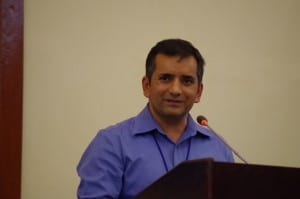
Migrant workers pay the price for globalization.–Rajiv Pandita, executive director of the Asia Monitor Resource Center (AMRC). Credit: Solidarity Center/Kate Conradt
Pandita, whose organization promotes democratic labor in Asia, spoke on the panel, Precarious Work and Labor Migration, the first portion of the Monday afternoon plenary Labor Migration: Who Benefits? A Solidarity Center Conference on Worker Rights & Shared Prosperity.
“The story takes place in the intricate network of supply chains,” Pandita says. Global supply chains account for 80 percent of global trade, and Asia accounts for 50 percent of that portion.
“The systematic marginalization of migrant workers is a crisis for democracy.”
Panel moderator John Hosinski, Solidarity Center senior program officer for Africa, defined precarious work as characterized by low wages, unstable employment and is legally ill-defined, which leads to the exclusion of workers from laws that enable them to form unions and gain power to achieve decent work.
Describing the years of apartheid South Africa, Jane Barrett, affiliate support coordinator, Congress of South African Trade Unions (COSATU), pointed out that apartheid was based on large-scale, cheap labor, control of internal migration and short-term contracts with no economic or social rights for all black workers.
“Apartheid is similar to cross-border migration today.”
Barrett described the efforts of COSATU and its affiliates to organize and support migrant workers, including the Food and Allied Workers Union’s focus on organizing migrants in cross border trade and the National Union of Mineworkers’s campaign for permanent residency of migrant workers.
A fundamental part of empowering migrant workers, Barrett says, is first educating union members in a federation-wide awareness campaign, one that involves challenging assumptions and providing a new way of seeing migrant workers.
Closing the session, Alison Friedman, vice president of the Global Fund to End Slavery, challenged participants to successfully convey the economic argument for migrant worker rights as well as the moral argument. Friedman said companies that are leaders in providing decent work for migrant workers say they do so because it helps their bottom line—workers who earn a living wage in safe and healthy workplaces are much better workers.
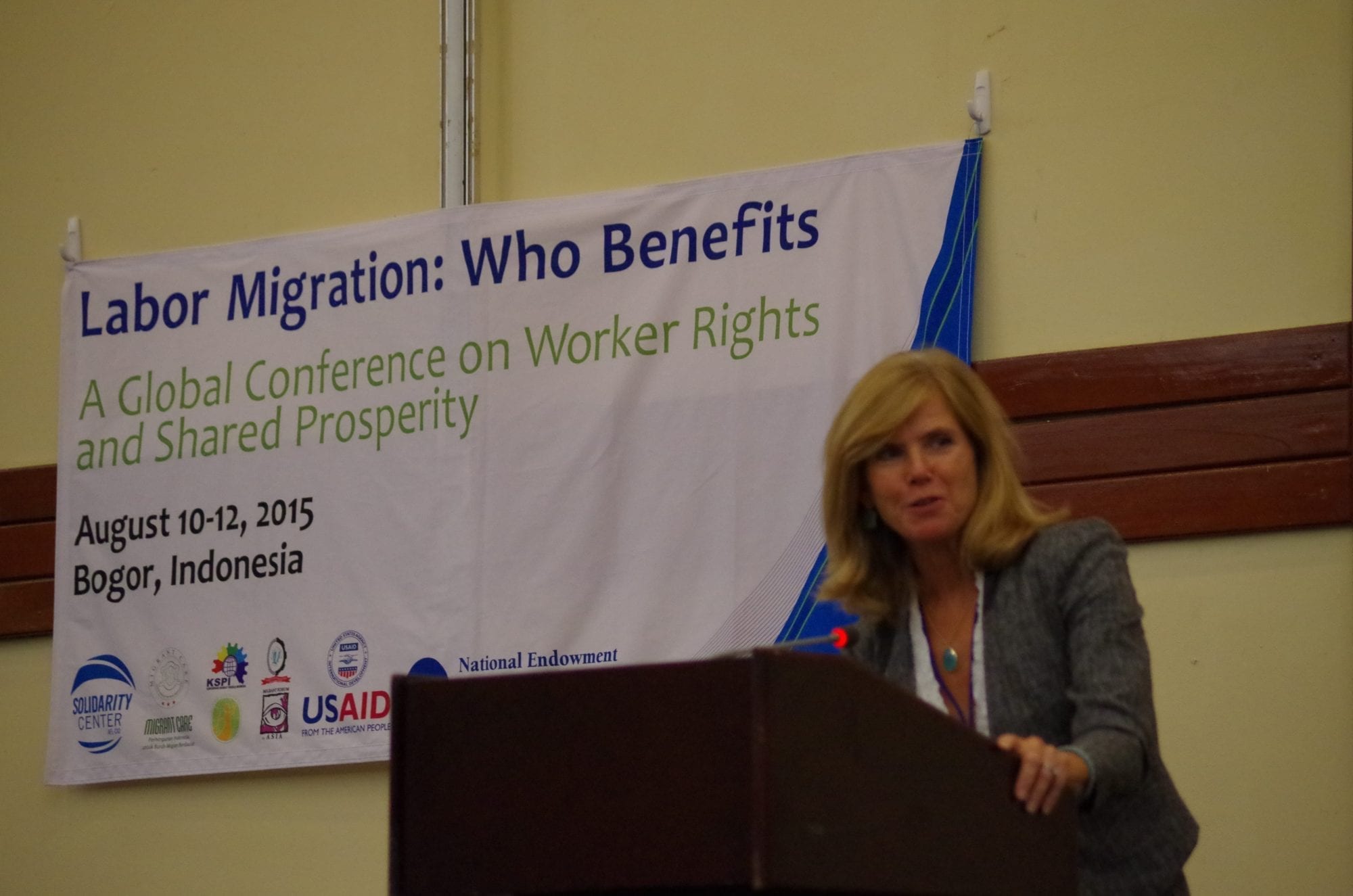
Aug 10, 2015
Highlighting the rampant economic inequality across the globe that is in part driving people to migrate for work far from their homes, Michelle Leighton, chief of the Labor Migration Branch at the International Labor Organization (ILO), provided a detailed look at the ILO’s current and planned response to addressing the many challenges migrant workers face in getting decent work.
“We face the largest crisis of human mobilization since World War II,” Leighton said in her keynote speech this morning at Labor Migration: Who Benefits? A Solidarity Center Conference on Worker Rights & Shared Prosperity.
“News seems to come almost daily about the crisis that drives people to seek an economic life somewhere else,” she said, pointing out that 1.5 billion people are living in places other than their homes.
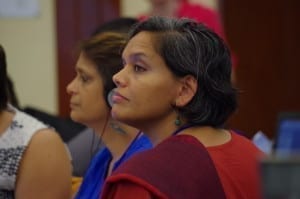
Participants at the Solidarity Center labor migration conference. Credit: Solidarity Center/Kate Conradt
Among the challenges to ensuring migrant workers have a chance at shared prosperity is the anti-migrant stance of some countries. “Shutting doors won’t solve the problem. It pushes the problem to others to solve.”
Leighton also touched on the key issue of labor recruitment, which she described as one of the most unregulated areas in all migration governance.
“Migrants pay thousands and thousands of dollars to get a job,” but the recruitment process is where migrants “have a much higher chance of being engaged in human trafficking.” Even when governments have regulations on recruitment, it often does not matter because so many illegal recruiters operate with impunity.
The ILO is helping push ratification of the fair migration convention and is also working with the International Trade Union Confederation (ITUC) to collect data on migrant workers because so little information exists. In a survey of 120 countries, preliminary data show that about 75 percent of adult migrants age are migrant workers.
In short, Leighton said, “creating decent work at home” is among the keys at the heart of the strategies for ensuring all workers, including migrant workers, take part in shared prosperity.
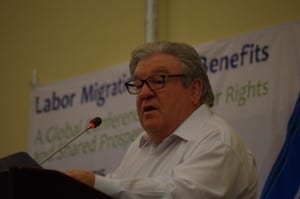
Our vision is one of “shared prosperity and fairness” –Jim Boland, president of the International Union of Bricklayers & Allied Craftworkers. Credit: Solidarity Center/Kate Conradt
Leighton was part of a panel moderated by ITUC Equality Department Director Chidi King and was introduced by Jim Boland, president of the International Union of Bricklayers & Allied Craftworkers.
Drawing on his experience as an Irish immigrant to the United States, Boland discussed the plight of migrant workers, but noted that even as migrant workers face poverty, discrimination and violence, “they are organizing in their community to end discrimination and violence and amplify their voices.”
“While many migrant workers are forced into poverty, with a lack of decent work and violence, migrant workers are mobilizing and developing innovative strategies for building worker power. Collective bargaining and a voice through unions is a key to developing the strength migrant workers need to ensure they have decent work, he said.
Boland urged conference participants to “use this opportunity to forge new partnerships and strengthen the connection with our brothers and sisters within the region and…take these strategies back home and push policy makers for a more just system.”
Our vision, Boland said, is one of “shared prosperity and fairness.”
Follow the conference on the website and on Twitter @SolidarityCntr.
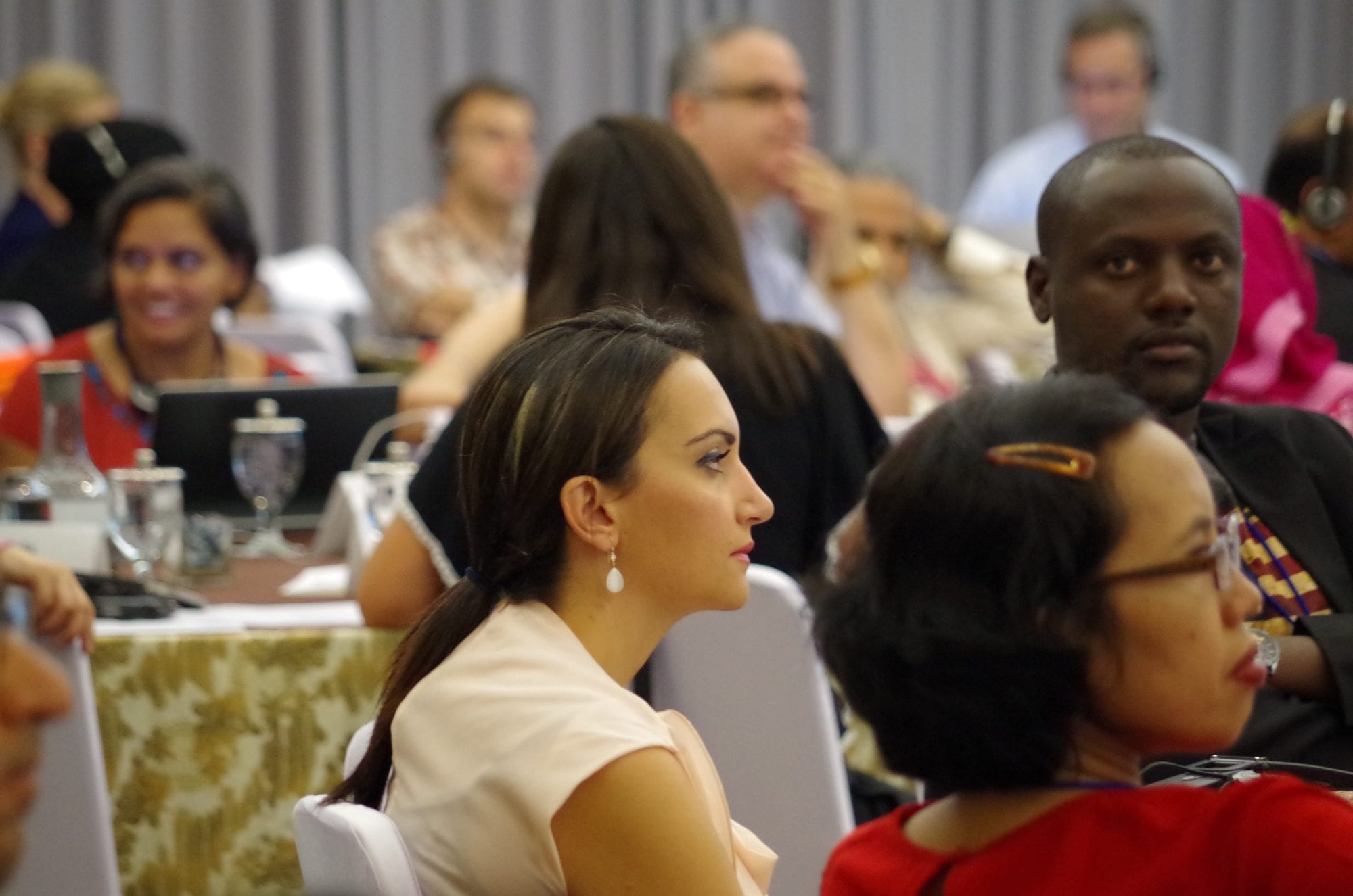
Aug 10, 2015
With 247 million migrants around the world, the vast majority of whom are migrating for labor, “migration is the defining issue of our time,” says Sabina Dewan, president and executive director of JustJobs Network.
“We need to talk about just jobs…so workers who want to migrate, migrate because of choice, not compulsion,” says Dewan, who opened the second morning session of Labor Migration: Who Benefits? A Solidarity Center Conference on Worker Rights & Shared Prosperity this morning in Bogor, Indonesia.
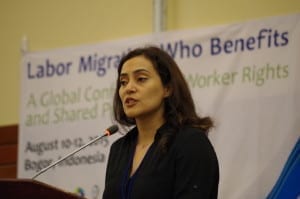
“We need to talk about just jobs…so workers who want to migrate, migrate because of choice, not compulsion,” –Sabina Dewan, president and executive director of JustJobs Network. Credit: Solidarity Center/Kate Conradt
Dewan pointed out that migrant workers will send $500 billion to developing countries this year, which is more than three times the official development assistance these countries will receive, and half of the funding they receive in direct foreign investment.
“This is what is driving governments to think about migration as a development strategy,” she says. But governments are confusing migration remittances for poverty reduction with development.
“Legal migration is to benefit all—the country of destination, the country of origin and the migrants themselves,” says Nicola Piper, speaking with Dewan on the plenary panel, “Toward a Shared Prosperity Agenda.”
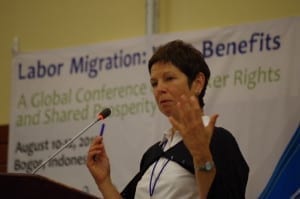
“More resources are being poured into border control rather than labor inspection”–Nicola Piper, professor at the University of Sydney in Australia. Credit: Solidarity Center/Kate Conradt
“Far more (state) resources are being poured into border control rather than labor inspection,” says Piper, who is a professor at the University of Sydney and the vice president of Global Migration Policy Associations in Australia. While paying lip service to human rights, states are focusing on controlling migration and extracting money from the migration process.
Right now, says Piper, the key beneficiaries “end up being labor recruiters and employers.”
Opening access to justice for migrant workers and changing the development paradigm to ensure migrant workers take part in shared prosperity is key to the discussions which more than 200 conference participants will engage in as they discuss strategies on organizing migrant workers, reforming the labor recruitment process and ensuring migrant worker access to justice.
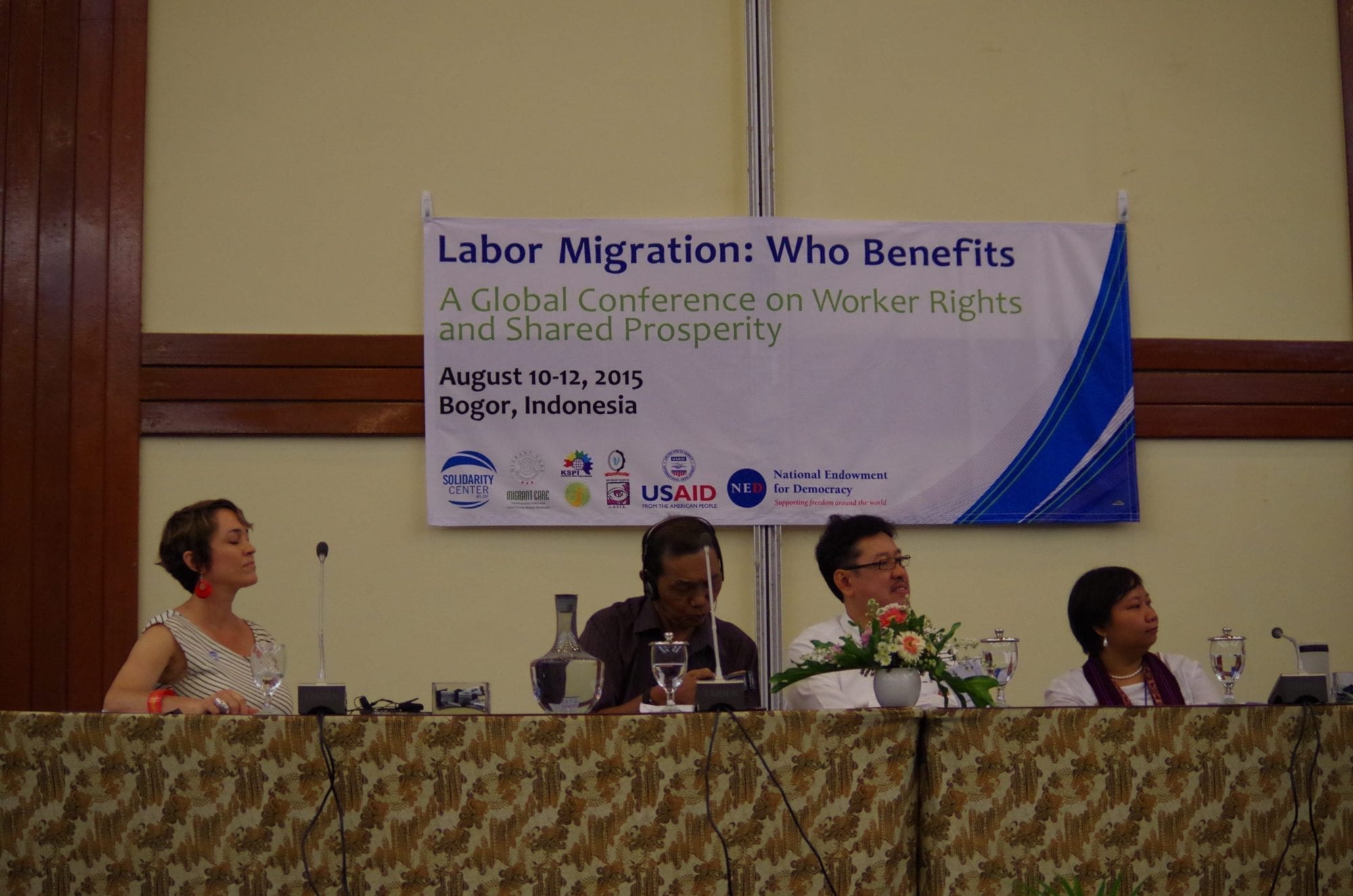
Aug 10, 2015
Saying that “labor migration takes place in an economic context of massive and growing global economic inequality,” Shawna Bader-Blau, Solidarity Center executive director, helped set the stage for the first day of the August 10–12 event, Labor Migration: Who Benefits? A Solidarity Center Conference on Worker Rights & Shared Prosperity.
“Systems that regulate labor migration do so to the detriment of equitable development and shared prosperity and even contribute to rising inequality—rather than relieve it,” Bader-Blau said. (Read Bader-Blau’s full speech.)

Solidarity Center Executive Director Shawna Bader-Blau spoke at the opening session of Labor Migration: Who Benefits? Credit: Solidarity Center/Kate Conradt
Meeting in Bogor, Indonesia, more than 200 conference participants from 45 countries are discussing strategies on organizing migrant workers, reforming the labor recruitment process and ensuring migrant worker access to justice. Neha Misra, Solidarity Center senior specialist for migration and human trafficking, welcomed participants to the three-day conference.
Anis Hidayah, Migrant Care executive director, pointed to an often overlooked aspect driving labor migration—the feminization of poverty. “Migration is full of women issues,” says Hidayah, many involving gender-based violence, especially for domestic workers, the vast majority of whom are women. Based in Indonesia, Migrant Care is co-sponsoring the conference with the Solidarity Center.
In Indonesia, 53 percent or more of Indonesian migrant workers are women and most are domestic workers, who are “vulnerable to gender-based violence,” Hidayah said.
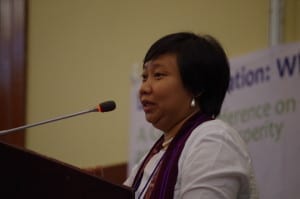
Most domestic workers are migrant workers, and many are “vulnerable to gender-based violence.”–Anis Hidayah, executive director, Migrant Care
She pointed out that Bogor, where participants are meeting, is the location of many labor recruitment agencies “that send migrant workers without protection of their rights.”
Also opening the morning plenary, Harry Sudamanto, representative of Indonesia’s Ministry of Manpower and Transmgration, said that the government “has the obligation to deliver the protection for all the migrant workers overseas,” starting from their departure through employment until they return to Indonesia.
Sofyan Abdul Latief, vice president Konfederasi Serikat Pekerja Indonesia (KSPI), discussed how the union provides services to migrants before departure, especially with document preparation. Labor brokers often do not list correct addresses or ages of migrant workers, and so “when a problem happens abroad, it is really difficult to track a person.”
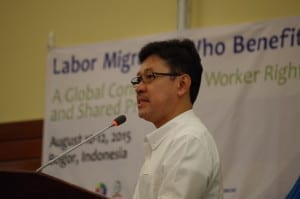
Harry Sudamanto, representative of the Indonesian Ministry of Manpower and Transmigration, said the government has the obligation to protect migrant workers from the time they leave to the time they return. Credit: Solidarity Center/Kate Conradt
“They don’t know if they will be placed at the right job they will be promised. They never know.”
The truth is, says Bader-Blau, “we are actually living with temporary migration system perfectly designed to reflect the economic value of profit over people, and the political choice to create a hierarchy of rights—in this case, worker rights—that serves that economic interest.
“It’s a system in which low wage men’s labor is expendable, and deeply undervalues women’s work. And I would go one step further and say there is nothing at all market driven about this phenomenon. It’s interest based—elite interest based, and deeply political.”
Bader-Blau urged participants to “take a page out of Indonesia” in moving forward with an agenda that empowers migrant workers.
“Nearly 20 years ago the Indonesian people, led by labor unions and student groups, took a risk and dreamt of something bigger and something better and they changed the face of their nation. Everyone we need to dream up a global civil rights movement for shared prosperity, is right here in this room—let’s make it happen.”
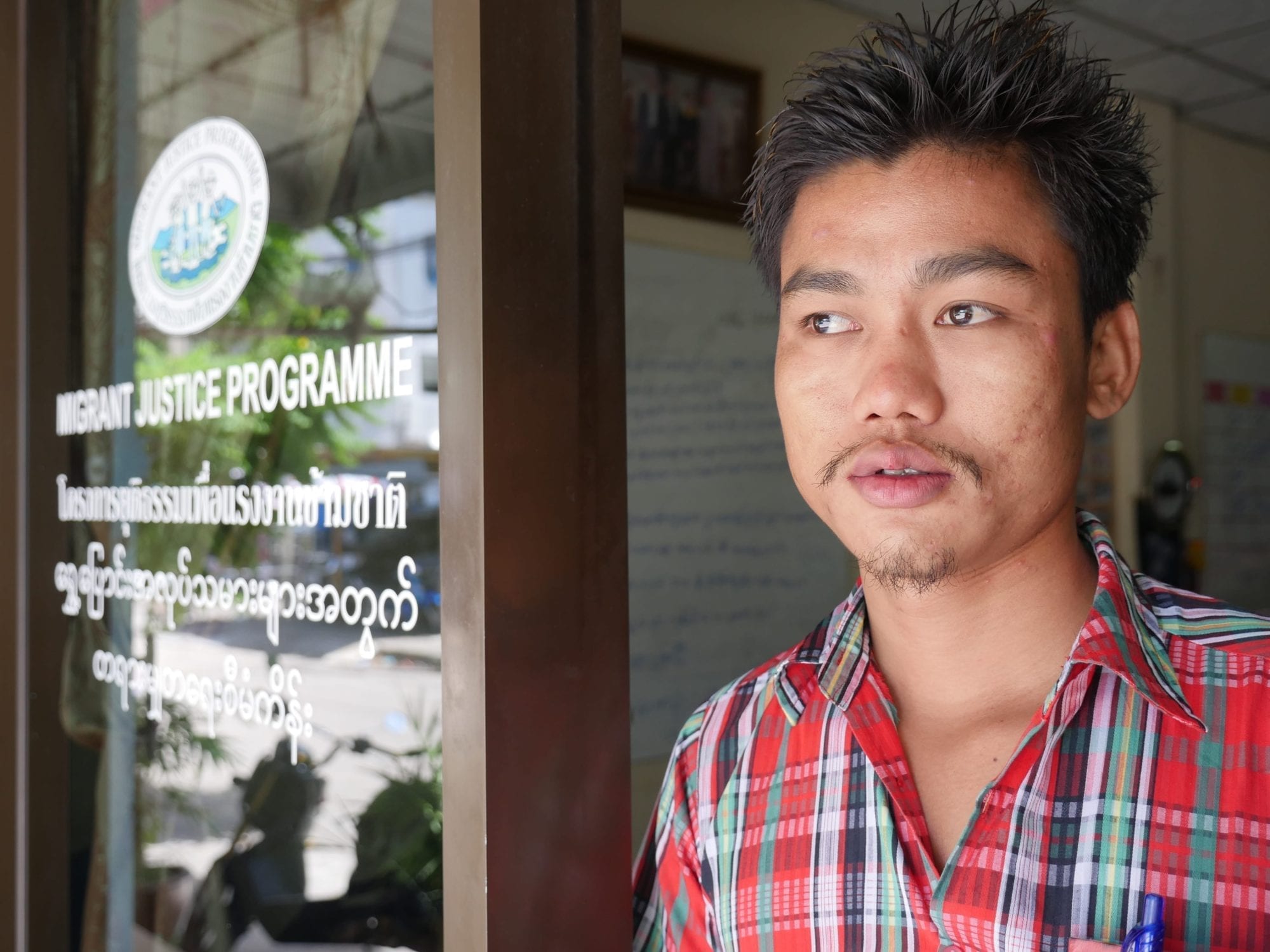
Aug 9, 2015
Human rights lawyer Preeda Tongcumnum is among the more than 200 migrant worker advocates gathering in Bogar, Indonesia, this week to take part in the Solidarity Center labor migration conference. As assistant to the secretary general at the Human Rights and Development Foundation (HRDF), Tongcumnum helps migrant workers in Thailand understand their legal rights and advocates for policies that support migrant workers.
Another conference participant, Jane Barrett, affiliate support coordinator at the Congress of South African Trade Unions (COSATU), heads up a network of unions and worker associations that coordinate organizing and support for informal economy workers, including migrant workers. Barrett plans to “share some of our fledgling attempts and thinking around organizing migrant workers and to learn from other successful examples.”
Traveling from the United States, where he organizes a largely migrant workforce, Pablo Alvarado, executive director of the National Day Labor Organizing Network (NDLON), also is joining the August 10–12 event, Labor Migration: Who Benefits? A Solidarity Center Conference on Worker Rights & Shared Prosperity.
Tongcumnum, Barrett and Alvarado offer a glimpse of the broad range of migrant worker activists who are bringing their diverse experiences, challenges and successes together for three days to achieve one goal: empowering migrant workers.
They will share strategies on organizing migrant workers, reforming the labor recruitment process and ensuring migrant worker access to justice.
They will address xenophobia and gender equality, and they will take time to celebrate their victories: Members of the International Domestic Workers Federation (IDWF) will mark achievements like the 2011 passage of an International Labor Organization convention stipulating rights of domestic workers, many who are migrants, and the formation of the organization which unites domestic workers from around the world.
Get facts about migrant workers and follow the events on our website and on Twitter @SolidarityCntr.













